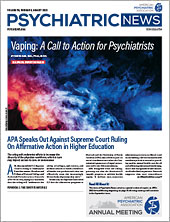APA’s Government, Policy, and Advocacy Update (August 2023)
APA Continues Efforts to Address Drug Shortages
APA Urges CMS Not to Lower Telepsychiatry Reimbursement Rates
APA’s Collaborative Care Model Legislation Enacted in Additional States
Information & Authors
Information
Published In
History
Keywords
- U.S. Food and Drug Administration
- U.S. Drug Enforcement Agency
- FDA
- DEA
- Stimulant shortage
- Drug shortage
- American Academy of Child and Adolescent Psychiatry
- AACAP
- House Energy and Commerce
- Senate Finance Committee
- Request for information
- Telepsychiatry reimbursement rates
- Centers for Medicare & Medicaid Services
- CMS
- 2023 Telepsychiatry Survey
- Reimbursement
- Telehealth
- Pandemic
- Government Policy and Advocacy Update
- Collaborative Care Model
- Integrative care
- CoCM
- Minessota
- Wyoming
Authors
Metrics & Citations
Metrics
Citations
Export Citations
If you have the appropriate software installed, you can download article citation data to the citation manager of your choice. Simply select your manager software from the list below and click Download.
For more information or tips please see 'Downloading to a citation manager' in the Help menu.
There are no citations for this item
View Options
View options
Get Access
Login options
Already a subscriber? Access your subscription through your login credentials or your institution for full access to this article.
Personal login Institutional Login Open Athens loginNot a subscriber?
PsychiatryOnline subscription options offer access to the DSM-5-TR® library, books, journals, CME, and patient resources. This all-in-one virtual library provides psychiatrists and mental health professionals with key resources for diagnosis, treatment, research, and professional development.
Need more help? PsychiatryOnline Customer Service may be reached by emailing [email protected] or by calling 800-368-5777 (in the U.S.) or 703-907-7322 (outside the U.S.).
